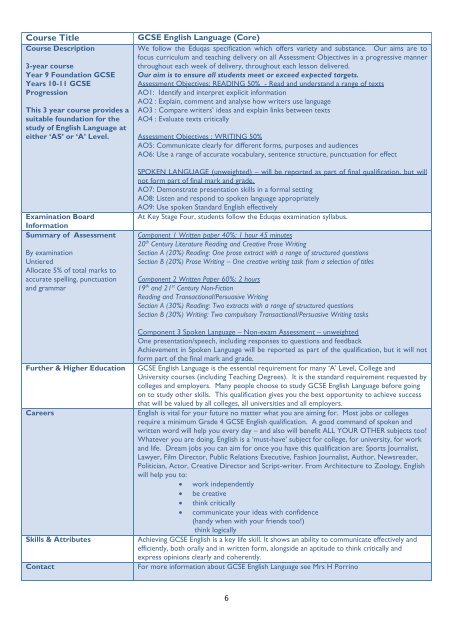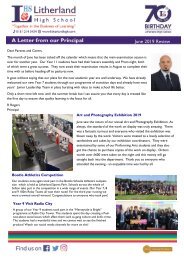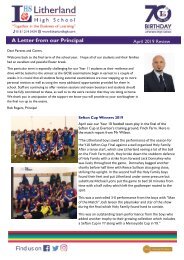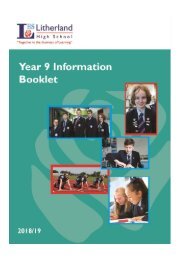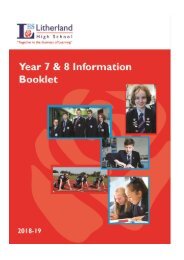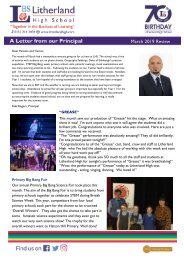LHS Options Booklet 2018 FNL
You also want an ePaper? Increase the reach of your titles
YUMPU automatically turns print PDFs into web optimized ePapers that Google loves.
Course Title<br />
Course Description<br />
3-year course<br />
Year 9 Foundation GCSE<br />
Years 10-11 GCSE<br />
Progression<br />
This 3 year course provides a<br />
suitable foundation for the<br />
study of English Language at<br />
either ‘AS’ or ‘A’ Level.<br />
Examination Board<br />
Information<br />
Summary of Assessment<br />
By examination<br />
Untiered<br />
Allocate 5% of total marks to<br />
accurate spelling, punctuation<br />
and grammar<br />
Further & Higher Education<br />
Careers<br />
Skills & Attributes<br />
Contact<br />
GCSE English Language (Core)<br />
We follow the Eduqas specification which offers variety and substance. Our aims are to<br />
focus curriculum and teaching delivery on all Assessment Objectives in a progressive manner<br />
throughout each week of delivery, throughout each lesson delivered.<br />
Our aim is to ensure all students meet or exceed expected targets.<br />
Assessment Objectives: READING 50% - Read and understand a range of texts<br />
AO1: Identify and interpret explicit information<br />
AO2 : Explain, comment and analyse how writers use language<br />
AO3 : Compare writers’ ideas and explain links between texts<br />
AO4 : Evaluate texts critically<br />
Assessment Objectives : WRITING 50%<br />
AO5: Communicate clearly for different forms, purposes and audiences<br />
AO6: Use a range of accurate vocabulary, sentence structure, punctuation for effect<br />
SPOKEN LANGUAGE (unweighted) – will be reported as part of final qualification, but will<br />
not form part of final mark and grade.<br />
AO7: Demonstrate presentation skills in a formal setting<br />
AO8: Listen and respond to spoken language appropriately<br />
AO9: Use spoken Standard English effectively<br />
At Key Stage Four, students follow the Eduqas examination syllabus.<br />
Component 1 Written paper 40%: 1 hour 45 minutes<br />
20 th Century Literature Reading and Creative Prose Writing<br />
Section A (20%) Reading: One prose extract with a range of structured questions<br />
Section B (20%) Prose Writing – One creative writing task from a selection of titles<br />
Component 2 Written Paper 60%: 2 hours<br />
19 th and 21 st Century Non-Fiction<br />
Reading and Transactional/Persuasive Writing<br />
Section A (30%) Reading: Two extracts with a range of structured questions<br />
Section B (30%) Writing: Two compulsory Transactional/Persuasive Writing tasks<br />
Component 3 Spoken Language – Non-exam Assessment – unweighted<br />
One presentation/speech, including responses to questions and feedback<br />
Achievement in Spoken Language will be reported as part of the qualification, but it will not<br />
form part of the final mark and grade.<br />
GCSE English Language is the essential requirement for many ‘A’ Level, College and<br />
University courses (including Teaching Degrees). It is the standard requirement requested by<br />
colleges and employers. Many people choose to study GCSE English Language before going<br />
on to study other skills. This qualification gives you the best opportunity to achieve success<br />
that will be valued by all colleges, all universities and all employers.<br />
English is vital for your future no matter what you are aiming for. Most jobs or colleges<br />
require a minimum Grade 4 GCSE English qualification. A good command of spoken and<br />
written word will help you every day – and also will benefit ALL YOUR OTHER subjects too!<br />
Whatever you are doing, English is a ‘must-have’ subject for college, for university, for work<br />
and life. Dream jobs you can aim for once you have this qualification are: Sports Journalist,<br />
Lawyer, Film Director, Public Relations Executive, Fashion Journalist, Author, Newsreader,<br />
Politician, Actor, Creative Director and Script-writer. From Architecture to Zoology, English<br />
will help you to:<br />
work independently<br />
be creative<br />
<br />
<br />
think critically<br />
communicate your ideas with confidence<br />
(handy when with your friends too!)<br />
think logically<br />
Achieving GCSE English is a key life skill. It shows an ability to communicate effectively and<br />
efficiently, both orally and in written form, alongside an aptitude to think critically and<br />
express opinions clearly and coherently.<br />
For more information about GCSE English Language see Mrs H Porrino<br />
6


